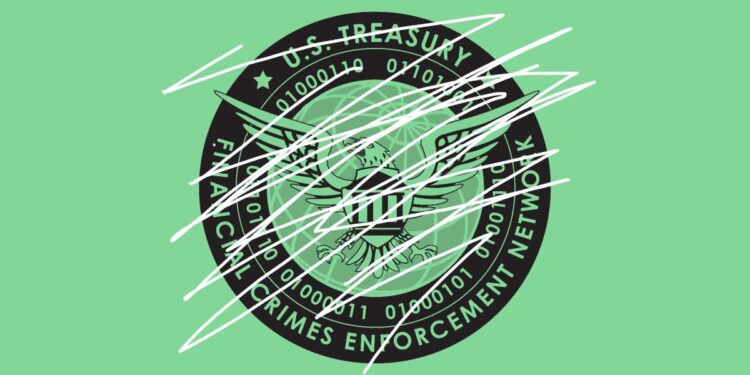After years of serving as a top destination for the world’s dirty money—stashed in untraceable LLCs, impenetrable trusts, and anonymously-owned properties—the United States was on the cusp of turning a corner. Congress had passed bipartisan legislation compelling shell companies to divulge their owners to the Treasury Department, which has also imposed new rules to bring similar transparency to the real estate and private equity sectors, two of the most popular havens for illicit wealth. But Donald Trump’s return to power has cast doubt on the future of the most monumental anti-kleptocracy reform push in decades.
Increasingly, the United States has become the epicenter of the multi-trillion-dollar offshore economy. Much of that was due to the nation’s willingness to provide anonymous shell companies to anyone who wanted one, with states such as Delaware, Nevada, and Wyoming one-upping each other with permissive laws designed to entice corporate clients to their states. The World Bank reported in 2011 that the US had formed more anonymous companies than the 41 leading tax havens combined. And that trend only accelerated in the years that followed.
In 2021, however, Congress passed the Corporate Transparency Act, which required LLCs to disclose their owners effective this year. The rules are hardly onerous. The paperwork takes minutes to fill out and, unlike shell-company registries in other countries, the US database is only visible to federal authorities. Still, anti-corruption watchdogs heralded the law as a sea change.
Now, all that progress is at risk.
Trump has hardly been an anti-corruption crusader—his business empire has relied heavily on the use of shell companies and his properties have been a sponge for kleptocratic cash. And while the first Trump administration formally endorsed the Corporate Transparency Act, Trump attempted to veto the legislation, since it was bundled within a larger defense spending bill that Trump decried because it included a provision to rename military bases honoring Confederates.
Project 2025, the Heritage Foundation’s policy blueprint for the second Trump term that the president has embraced following his election win, offers an indication of how the hard-fought gains on anti-corruption policy could unravel. Citing the supposed burdens to small business owners, the document calls for Congress to “repeal the Corporate Transparency Act.”
Yet repeal of the law may not even be necessary to dismantle it. A parallel campaign of legal warfare—that includes lawsuits by more than two dozen state attorneys general in Republican-led states, who are challenging the Corporate Transparency Act’s constitutionality—has already placed the law at risk. The US Supreme Court recently ruled that the new shell company database can proceed, though the ruling was only about lifting a previous injunction, not about the law’s overall constitutionality. For now, the Trump administration is still defending the law in court, but the White House has also said it wants to continue “to assess the potential burden” of the shell company registry. But the administration’s recent decision to dissolve the Justice Department’s kleptocracy-related task forces and kneecap enforcement of the Foreign Corrupt Practices Act, which bans American companies from bribing foreign officials, doesn’t bode well for its commitment to cracking down on money laundering.
Even if the new administration doesn’t formally disband the shell company database, there’s another scenario that could doom shell company reform. Trump and his inner circle have already dedicated themselves to slashing regulatory oversight, so there’s every reason to think the shell company registry could simply whither on the vine of disinterest and disuse. (That is what occurred in the U.K., before much-needed reforms tightened oversight requirements.) Alternatively, the administration could simply use the law selectively to go after political enemies or Iran- and cartel-linked entities, while ignoring kleptocrats, oligarchs, and money launderers.
Shell company transparency isn’t the only anti-corruption reform effort in jeopardy. Shortly after Congress pushed for the shell company registry, the Biden administration moved to close another major money-laundering loophole. Since the early 2000s, both the real estate and private investment sectors (including private equity, hedge funds, and venture capital) have been exempt from rules requiring basic anti-money laundering checks on clients. These exemptions, first issued in 2002 after the PATRIOT Act attempted to close down money-laundering pathways, were initially pitched as temporary measures, providing regulators time to study their effect on the real estate and private investment industries. More than two decades later, however, these exemptions remained in effect.
But last year, the Treasury Department finalized rules to bring basic transparency to both sectors. The rules, mandating anti-money laundering checks for both industries, were hardly panaceas; the proposed real estate reforms, for instance, only targeted residential real estate, leaving commercial real estate wide open to kleptocratic networks. Still, combined with the shell company reforms, the loophole closures would have ended the US’s role as an offshore giant.
Now, it’s unclear if the Trump administration will follow through on enforcing the new rules. The good news is that there appears to be at least some appetite in the new administration for keeping them, since they can be used to target cartels and terrorist networks. “Congress could repeal [the rules] or Treasury could rescind them,” Gary Kalman, the head of Transparency International’s US chapter, told me. “The latter requires administrative steps such as gathering public comments and a legally required review and response. Since there appears to be support for these policies among incoming Treasury officials, as new tools to counter terrorist financing and to bankrupt drug cartels, we don’t see either of these attacks as likely.”
But the biggest question remains the president himself—and the early signs don’t look good. His launch of a meme coin days before taking office—making it possible for anyone seeking to curry favor with him to shove untraceable cash into his pocket—suggests that Trump will have little interest in fostering financial transparency. His anti-anti-corruption crackdown at the Justice Department, meanwhile, sends another ominous signal that Trump plans to make kleptocracy great again.







